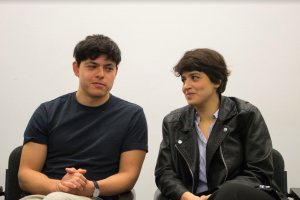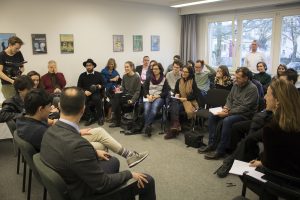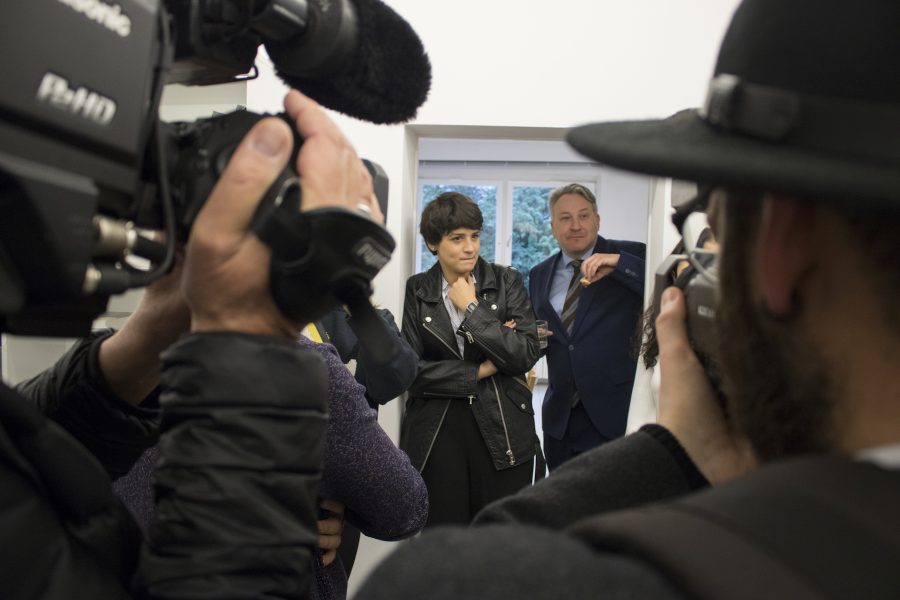On Monday, the 10th of December, Bard College Berlin welcomed Sara Mardini back to its campus. It felt fitting that Sara came back to her new home in Berlin on Human Rights Day. During lunch in the cafeteria, Managing Director Florian Becker quoted articles from the Universal Declaration of Human Rights regarding the right to a fair trial and the right to seek asylum. Sara also gave a speech in which she thanked the BCB student body for their support and activism, and said that she would do it all again if she had to because she has done nothing wrong in helping people.
We listened to her, happy that to some degree justice had prevailed. There is still the trial to come, but we celebrated this victory with glasses of Sekt and toasted in hope of the next legal victory.
Then, on Wednesday the 12th of December, Sara and fellow volunteer Seán Binder got a chance and a platform to talk about their experiences for an hour during a press conference in BCB’s main administration building, answering questions from journalists from different media outlets like the AFP, Deutsche Welle, The Times, Süddeutsche Zeitung and ZDF. Their experiences would be written about by many journalists, but now – unlike when they were in prison – they could speak for themselves.
Along with them spoke their lawyer, who at first answered more technical questions such as whether there was any basis to the accusations against Sara and Seán, to which the answer was obviously no. The lawyer explained that 37 other people were also facing similar charges, pointing to an attempt of the Greek authorities to criminalize humanitarian aid.
“We did something we weren’t supposed to do: We proved they were innocent,” said Zacharias Kesses, their lawyer, regarding the documentation Sara and Seán’s legal team provided that gave the authorities enough reason to release them from pre-trial detention.
Many more questions about Sara and Seán’s accusations came up to the point where only their lawyer was answering them: To journalists not too familiar with the case, these legal matters seemed to be the important details. But these questions weren’t allowing the real story to be spoken forth. The technical nature of the first questions made it so that only their lawyer could give proper answers, which is obviously important for a case like theirs, but it left Sara and Seán unable to say much at the beginning.
“Instead of asking you about what you are accused of, Sara, Seán, maybe you can talk about what you were doing on Lesvos?” Asked BCB’s managing director Florian Becker, allowing for a shift in narrative to what some might call a more “human” side of the matter.

Sara and Seán talked about how some of ERCI’s (Emergency Response Centre International) operations worked on the Greek island. They mentioned that ERCI had many different programs such as the Medical Program, the Kids Program, and the Washing Program — which Sara set up and gathered money for. Sara was able to gather donations for multiple washing machines so that the residents of the refugee camp Moria can have clean clothes. Seán pointed out that this program greatly helped with getting rid of the outbreak of scabies in the camp.
“We tried to coordinate and improve the organization on the island. What we did was right. There is nothing wrong with getting people out of the water,” asserted Sara.
“Some people claim the existence of a ‘pull factor’,” said Seán, referring to the false idea that the increasing number of NGOs on islands like Lesvos increases the number of refugee arrivals when in fact in the past year this number has actually decreased. “There is no relationship between the amount of refugee arrivals and NGOs. But more people die when there are no NGOs,” added Seán.
The refugee camp Moria, where Sara and Seán were giving humanitarian aid, is still massively overcrowded with over 7000 people living in a space meant for about 2000. With NGOs forced to leave the island after the humanitarians’ arrests, the situation there is undoubtedly worse, explained Sara and Seán. For example, the ERCI was essentially forced out since their coordinator, Nassos Karakitsos — who has been released along with Sara and Seán — was also in pre-trial detention for over three months. These dire circumstances will not be adequately mitigated without EU action on the matter both in the form of getting aid groups back on the island and by welcoming more refugees into continental Europe.

They also spoke about their time in prison. Seán said that it was a horrible experience, while Sara elaborated on hers:
“My time in Athens was better than in Lesvos. There was no bathroom in the cell in Lesvos, so it was very strange to me that I had to ask every time I wanted to use the toilet. So I stopped drinking water,” said Sara about the time she was held in a police station for two weeks because there was no female prison on the island.
“In Athens, we had a shower and toilets,” said Sara. “I was like the spoiled kid in the jail; everyone knew about my case. But I was thinking about how, when you are in jail, people forget about you. I felt abandoned sometimes, and that is also the case for many other prisoners.”
Sara recounted that she was constantly impatient to get out of jail, while she saw many prisoners simply accepting their long prison sentences. She said that she would be interested in raising awareness for issues regarding prisoners’ rights because they are a segment of the population that is absent from the public view and often the public imagination.
“Some people in the jail were innocent like me, while some weren’t. But even if they are criminals, they are still human beings,” Sara reflected.
Ultimately, the two volunteers are looking ahead. Seán will look for a job and Sara will focus on school. But more than this they will make the best of this truly bad experience and turn it into action and advocacy.
“Before we weren’t heard. At the end we gained respect globally,” said Sara.
“In a way, we are given a privileged platform and we should use it,” concluded Seán, paving the way for the future of volunteer work.

